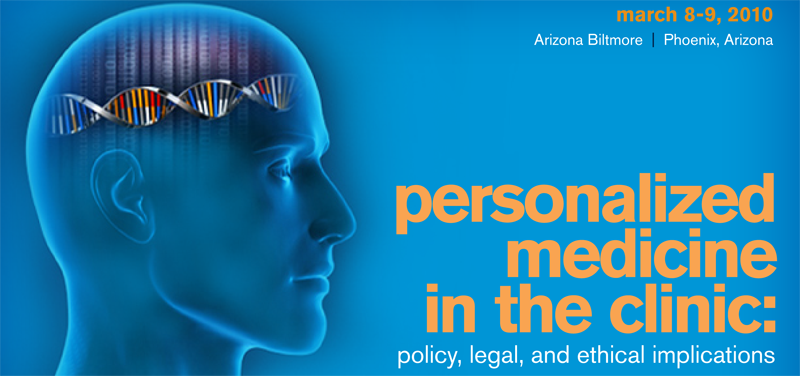Other Information
About Phoenix, AZ
ASU
The Center for Law, Science & Innovation
Mayo Clinic
AAAS
FDLI
Sandra Day O'Connor College of Law
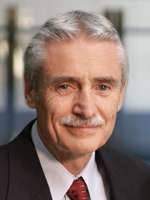
Lee Hartwell
President and Director, Fred Hutchinson Cancer Research Center, Seattle; Incoming Co-Director, Center for Sustainable Health, The Biodesign Institute, Arizona State University
Lee Hartwell is the recipient of many national and international scientific awards, including the 2001 Nobel Prize in Physiology or Medicine, the 1998 Albert Lasker Basic Medical Research Award, the 1992 Gairdner Foundation International Award and the Alfred P. Sloan Award in cancer research. He is a professor of genome sciences and an adjunct professor of medicine at the University of Washington School of Medicine, and an American Cancer Society Research Professor of Genetics. Hartwell has a B.S. from the California Institute of Technology and a Ph.D. from the Massachusetts Institute of Technology, and he engaged in postdoctoral work at the Salk Institute for Biological Studies. In 1996, he joined the faculty of the Fred Hutchinson Cancer Research Center, and a year later he became its president and director. In addition to founding and co-directing ASU’s new Center for Sustainable Health, Hartwell is the university’s second Virginia G. Piper Chair of Personalized Medicine.
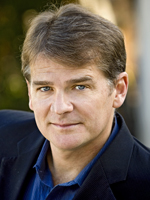
David Ewing Duncan
Author, Experimental man: what one man's body reveals about his future, your health, and our toxic world
David Ewing Duncan is an award-winning, best-selling author of seven books and numerous essays, articles and short stories, and a television, radio and film producer and correspondent. He is a columnist for MIT’s Technology Review and the Chief Correspondent for public radio’s “Biotech Nation.” He writes for the New York Times, Fortune, Discover, National Geographic, and many other publications. Ewing Duncan is Director of the Center for Life Science Policy at the University of California, Berkeley, and a Visiting Researcher at the Graduate School of Journalism. His most recent book is the bestselling Experimental man: what one man’s body reveals about his future, your health, and our toxic world. He also is the author of Masterminds: Genius, DNA and the Quest to Rewrite Life and the international bestseller Calendar: Humanity’s Epic Struggle to Determine a True and Accurate Year. Ewing Duncan has been a Contributing Editor and columnist for Conde Nast Portfolio, and a Contributing Editor for Wired and Discover. He has been a longtime commentator for NPR’s “Morning Edition,” a special correspondent and producer for ABC’s “Nightline” and “20/20,” a correspondent for NOVA’s “ScienceNow!,” and a producer for Discovery Television.
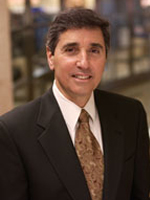
Denis A. Cortese
Emeritus President and Chief Executive Officer, Mayo Clinic
In addition to his responsibilities at Mayo Clinic, Denis Cortese is a Foundation Professor in the W.P. Carey School of Business and the Ira A. Fulton School of Engineering at ASU. Cortese also directs ASU’s Health Care Delivery and Policy Program. He serves on the board for Pinnacle West, RAND Health, and the National Coalition for Healthcare Information (NCHI), chairs The National Academies’ Institute of Medicine (IOM) Roundtable on Value and Science Driven Healthcare and is a member of the National Academy of Engineering’s Division of Engineering and Physical Sciences. Cortese is a member of the IOM and chairs its Roundtable on Evidence Based Medicine, and also is a member of the Healthcare Leadership Council (chair in 2007-2009), the Harvard/Kennedy Healthcare Policy Group, the Academia Nacional de Medicina (Mexico), the Royal College of Physicians (London), the Division on Engineering and Physical Science, and the National Research Council. He received the Ellis Island Award in 2007, the Medal of Merit Award in 2008, and the National Healthcare Leadership Award in November 2009.
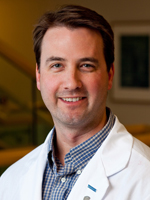
Derek Abbott
Assistant Professor, Department of Pathology, Case Western Reserve University, Cleveland
In 2006, Derek Abbott received a Burroughs Wellcome Career Award for his work in the lab in the Department of Systems Biology at Harvard Medical School where he began deciphering the signal transduction cascade initiated bacterial activation of the Crohn’s Disease susceptibility gene NOD2. Abbott graduated from the University of Virginia in 1993, then enrolled in the Vanderbilt University School of Medicine’s Medical Student Training Program. As a graduate student, he studied the breast cancer genes BRCA1 and BRCA2, ultimately attaining a Ph.D. in Cell Biology. After the completion of his medical school requirements, Abbott continued his clinical training in Anatomic Pathology at Brigham and Women's Hospital in Boston. Following his residency, he joined the lab of Dr. Lewis Cantley in the Department of Systems Biology at Harvard Medical School. Abbott joined Case Western Reserve University in 2006. Abbott joined Case Western Reserve University in 2006, and his lab has continued to work on Crohn’s Disease genetics, most recently publishing findings on the genetic interaction of ITCH and NOD2 and its implications for Crohn’s Disease pathophysiology.
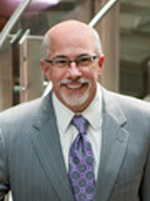
Michael Birt
Co-Director, The Biodesign Institute, Center for Sustainable Health, Arizona State University; Professor, W.P. Carey School of Business, ASU; Executive Director, Pacific Health Summit; Affiliate Investigator, Fred Hutchinson Cancer Research Center, Seattle
Michael Birt has extensive experience in the private sector and the academic world as well as with non-profit organizations. Prior to his current position, Birt was Senior Vice President at the National Bureau of Asian Research and the founding director of NBR’s Center for Health and Aging. He is a former assistant professor at the Henry M. Jackson School of International Studies at the University of Washington and at Wellesley College. He has served as a visiting professor at Keio University under a faculty grant from the Japan Foundation and as a nominated recipient of a Ministry of Education faculty appointment at Hitotsubashi University. Birt’s private sector experience includes the successful launch, development and stock sale of a leading U.S.-Asia biomedical business development company, and the founding of Infoplan Consulting, a division of McCann-Erickson Hakuhodo, a leading advertising and market research firm in Tokyo. He has consulted for many of the world’s leading health care, medical technology, and consumer product companies. Birt is co-author of Negotiating the Gray Maze: The Business of Medicine in Japan and has written articles for the Asian Wall Street Journal, Journal of the American Chamber of Commerce in Japan, as well as numerous industry consulting reports. He also funded and led the Pacific Health Alliance, which focused on the development of educational exchange and collaboration programs between U.S. and Japanese health care delivery systems in the field of hospital infection control. Birt received a Ph.D. in East Asian Studies from Princeton University and completed the Certificate Program in Gerontology at the University of Washington.
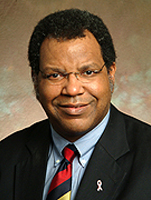
Otis Webb Brawley
Chief Medical Officer and Executive Vice President, American Cancer Society
Otis Webb Brawley is responsible for promoting the goals of cancer prevention, early detection, and quality treatment through cancer research and education at the American Cancer Society. Brawley champions efforts to decrease smoking, improve diet, detect cancer at the earliest stage, and provide the critical support cancer patients need. He also guides efforts to enhance and focus the research program, upgrade the Society’s advocacy capacity, and concentrate community cancer control efforts in areas where they will be most effective. Further, as an acknowledged global leader in the field of health disparities research, Brawley is a key leader in the Society’s work to eliminate disparities in access to quality cancer care. He is professor of hematology, oncology, medicine and epidemiology at Emory University. Brawley also is a former medical director of the Georgia Cancer Center for Excellence at Grady Memorial Hospital in Atlanta, and deputy director for cancer control at Winship Cancer Institute at Emory University. He has previously served as a member of the Society’s Prostate Cancer Committee, co-chaired the U.S. Surgeon General’s Task Force on Cancer Health Disparities, and filled a variety of capacities at the National Cancer Institute, most recently serving as Assistant Director. Brawley is a member of the Centers for Disease Control and Prevention Breast and Cervical Cancer Early Detection and Control Advisory Committee. He served as a member of the Food and Drug Administration Oncologic Drug Advisory Committee and Chaired the NIH Consensus Panel on the Treatment of Sickle Cell Disease. Brawley is a graduate of University of Chicago, Pritzker School of Medicine. He completed his internship at University Hospitals of Cleveland, Case-Western Reserve University, his residency at University Hospital of Cleveland, and his fellowship at the National Cancer Institute.
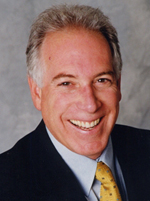
James Canton
Founder, Chief Executive Officer and Chairman, the Institute for Global Futures, San Francisco; Senior Fellow, Center for Research in Innovation, Kellogg School of Management, Northwestern University, Chicago
James Canton is a renowned global futurist, social scientist, keynote presenter, author, and visionary business advisor. For more than 30 years, Canton has been insightfully predicting the key trends that have shaped the world. He is a leading authority on future trends in innovation, and The Economist recognizes him as one of the leading futurists, worldwide. He is the author of The Extreme Future: The Top Trends That Will Reshape the World in the 21st Century, and Technofutures: How Leading-Edge Innovations Will Transform Business in the 21st Century. In 1990, Canton founded the Institute for Global Futures, a think-tank that advises business and government on future trends. He advises the Global Fortune 1000 on trends in innovation, financial services, health care, population, life sciences, energy, security, workforce, climate change and globalization. He is a Senior Fellow at the Center for Research in Innovation at Northwestern University’s Kellogg School of Management and is on the advisory board of the Corporate Eco Forum. Canton has advised three White House Administrations, the National Science Foundation and MIT's Media Lab, Europe. Recognized as “one of the top presenters in the 21st century” by Successful Meetings Magazine, Canton is a highly sought-after keynote presenter, and is noted for his fascinating, informative, dynamic and entertaining keynotes.
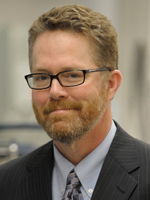
Michael F. Christman
President and CEO, Coriell Institute for Medical Research
After taking the helm of the Coriell Institute in 2007, Michael Christman established the Coriell Personalized Medicine Collaborative®, an evidence-based research study with the goal of determining the utility of using genome information in health management and clinical decision-making, as well as to discover presently unknown gene variants that elevate one’s risk of complex disease and affect one’s response to medications. Christman has been instrumental in cultivating partnerships with hospitals to help incorporate the healthcare perspective necessary to make the Colloborative a success. He has also been a proponent of expanding Coriell’s other successful scientific programs in the drive to further the Institute’s mission of scientific education and discovery. Christman is an expert in genetics and genomics and previously served as professor and founding chair of the Department of Genetics and Genomics for Boston University School of Medicine. There, he led an international team of scientists in one of the first genome-wide scans associated with human genetic variation in disease using samples from the Framingham Heart Study. Recently, Christman and other Coriell scientists collaborated with Charles Rotimi of the National Institutes of Health (NIH) to complete the largest genome-wide association study for hypertension and blood pressure in an African-American population to date. Christman received his bachelor’s degree in chemistry with honors from the University of North Carolina, Chapel Hill, in 1981 and a doctorate in biochemistry from the University of California, Berkeley, in 1985. He was awarded a Jane Coffin Childs postdoctoral fellow at Massachusetts Institute of Technology in 1986. He is a member of the Genetics Society of America, the New Jersey Technology Council Board of Directors and the NIH Drug Discovery and Experimental Pharmacology Study Section.
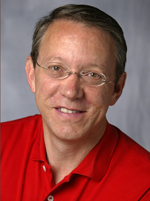
Robert Cook-Deegan
Director, Center for Genome Ethics, Law, and Policy, Institute for Genome Sciences and Policy, Duke University; Research Professor, Public Policy Studies, Biology and Department of Medicine, Duke University
Before arriving at Duke in 2002, Robert Cook-Deegan, M.D., directed the Robert Wood Johnson Foundation Health Policy Fellowship program at the Institute of Medicine (IOM), National Academy of Sciences, and previously was the founding director of IOM's National Cancer Policy Board. While at IOM and other parts of the National Academies (1991-2002), he worked on mental health policy, tobacco control, cancer policy, biomedical research policy, and federal research and development budgeting. Cook-Deegan worked at the National Center for Human Genome Research at the National Institutes of Health in its inaugural year (1989-1990), and was acting executive director of a congressional bioethics commission (1988-1989). He graduated from the University of Colorado Medical School in 1979, and from Harvard College (chemistry, magna cum laude) in 1975. Cook-Deegan chairs the Royalty Fund Advisory Committee for the Alzheimer’s Association and the external advisory board of a project on genetic testing for Alzheimer’s susceptibility, and he serves on a task force on patent reform sponsored by, among other educational organizations, the American Association of Universities and the Association of American Medical Colleges. He is a Fellow of the American Association for the Advancement of Science (AAAS) and a Council Delegate to the AAAS Section on Societal Impacts on Engineering. Cook-Deegan was a member of the Board of Directors, Physicians for Human Rights, with whom he participated in human rights missions to Turkey, Iraq, and Panama (1988-1996).
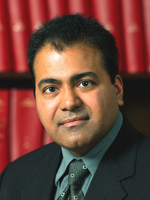
Prasad Devarajan
Williams Endowed Chair, Professor of Pediatrics and Developmental Biology, Director of Nephrology and Hypertension, Director of Clinical Laboratories, and CEO of the Dialysis Unit at Cincinnati Children’s Hospital Medical Center and the University of Cincinnati
Prasad Devarajan’s major research interests lie in the pathogenetic pathways, diagnostic biomarkers, and novel therapies of acute kidney injury. Devarajan’s laboratory has pioneered the discovery, translation, and validation of NGAL as a biomarker of acute kidney injury. He has authored more than 150 peer-reviewed publications, and serves on the Editorial and Review Boards of more than 30 journals. Devarajan has been continuously funded by the National Institutes of Health and several other foundations for 20 years.
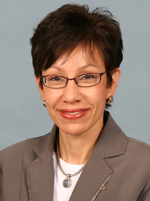
Patricia Deverka
Research Associate Professor, Institute for Pharmacogenomics and Individualized Therapy, Eshelman School of Pharmacy, University of North Carolina at Chapel Hill
Building on her experiences working as a researcher in industry, managed care and academic settings, Patricia Deverka is interested in identifying policy solutions to overcome barriers to clinical translation for personalized medicine technologies. Deverka is at the Institute for Pharmacogenomics and Individualized Therapy at the University of North Carolina at Chapel Hill, where she collaborates with multidisciplinary investigators to develop strategies that foster the appropriate integration of pharmacogenomics into clinical practice. Her research interests include issues such as coverage and reimbursement, provider and health care system readiness, and improving the evidence base for pharmacogenomic tests. Deverka has written on these topics and, in particular, the role of payers and cost-effectiveness analysis. Earlier in her career, she worked as an outcomes researcher in the pharmaceutical industry and was VP of Scientific Affairs at Medco Health, where she led several pharmacogenomic-related initiatives. Deverka has a medical degree from the University of Pittsburgh and is board certified in general preventive medicine and public health. She also obtained a Master’s degree in bioethics from the University of Pennsylvania and completed a fellowship at Duke University’s Institute for Genome Sciences and Policy.
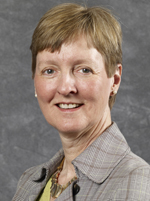
Barbara J. Evans
Associate Professor of Law, Co-director, Health Law and Policy Institute, and Director, Center on Biotechnology & Law, University of Houston Law Center
In addition to her responsibilities at the University of Houston Law Center, Barbara Evans is an Adjunct Research Professor of Clinical Pharmacology at the Indiana University School of Medicine and an Affiliated Investigator of the Indiana University Center for Bioethics. Evans’ research interests include governance, privacy, and financing issues with large health information networks and tissue repositories; regulatory and judicial uses of evidence from large-scale observational studies; and legal barriers to clinical translation of pharmacogenomics. Earlier in her career, she was a partner in the international regulatory practice of a large New York law firm and subsequently advised clients on U.S. privacy and research regulatory matters. Evans holds an electrical engineering degree from the University of Texas at Austin, M.S. and Ph.D. degrees from Stanford University, and a J.D. from Yale Law School. She also completed a post-doctoral Fellowship in Clinical Ethics at the M.D. Anderson Cancer Center.
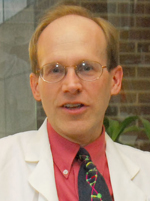
Photo credit: Karen Tam,The
New York Times
James P. Evans
Director, Adult/Cancer Genetics Services and The Bryson Program in Human Genetics, The University of North Carolina at Chapel Hill; Editor-in-Chief, Genetics in Medicine, the American College of Medical Genetics
James Evans’ research interests focus on cancer genetics, pharmacogenomics, the use of next generation genomic analytic technologies and the broad issue of how genetic information is used. Evans is an advisor to the U.S. Secretary of Health and Human Services on the subject of “Genetics, Health and Society,” and has been actively involved nationally and internationally in the education of high court judges about genetic and scientific matters. In 2004 he was a principle organizer and faculty member for a United Nations conference in Chile which was attended by more than 80 nations and addressed scientific disparities throughout the world. After obtaining his M.D. and Ph.D. from the University of Kansas, Evans served as resident and chief resident of Internal Medicine at The University of North Carolina. He trained in medical genetics at the University of Washington in Seattle before moving back to Chapel Hill. Evans is board certified in Internal Medicine, Medical Genetics and Molecular Diagnostics.
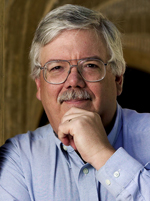
Henry Greely
Deane F. and Kate Edelman Johnson Professor of Law, Stanford Law School; Professor (by courtesy) of Genetics, Stanford School of Medicine
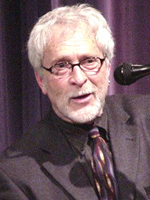
Lee Gutkind
Distinguished Writer-in-Residence, Consortium for Science, Policy & Outcomes, and Professor, Hugh Downs School of Human Communication, Arizona State University; Founding Editor, Creative Nonfiction
Lee Gutkind is the author and editor of more than 20 books, including, Almost Human: Making Robots Think, described by “The Daily Show’s” Jon Stewart as “wild-crazy-fascinating,” and the award-winning Many Sleepless Nights, a chronicle of the breakthroughs in the organ transplant world, and the story of how transplant therapy turned the corner. Upcoming is an anthology, Becoming a Doctor: From Student to Specialist, Doctor-Writers Share Their Experiences. Gutkind also is working on a book about personalized medicine. He is founder and editor of the groundbreaking magazine, Creative Nonfiction, the first and largest literary journal to exclusively publish nonfiction, and he frequently crosses genres as a writer, editor, reporter, novelist and filmmaker. In 2004, Gutkind was awarded an Honorary Doctorate of Letters from Chatham University.
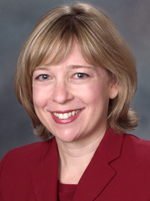
Katherine Hunt
Assistant Professor of Medicine, and Genetic Counseling Program Coordinator, Mayo Clinic Arizona
Over the past five years, Katherine Hunt has incorporated and developed the adult onset genetic counseling program at Mayo Clinic Arizona. Her clinical experience includes counseling individuals at risk for hereditary cancer syndromes, Alzheimer’s disease, cardiac disease and educating both physicians and patients prior to ordering genetic testing for CYP450 enzymes. Hunt is co-director of an annual Mayo Clinic Education Conference, Genomics in Medicine, targeted at educating primary care clinicians on practical genomic information. She co-authored the article, “Incorporating Genetic Counseling into a Primary Care Practice,” published in Resident & Staff Physician (2006). Hunt’s research interests include developing curriculum for clinicians involved in educating and ordering genomic tests. She graduated from Northwestern University with a M.S. in genetic counseling, is Board Certified in Genetic Counseling, and has begun a Ph.D. program in the Center for Society and Biology in the School of Life Sciences at ASU.
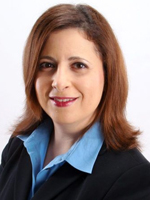
Amalia M. Issa
Founding Director, Program in Personalized Medicine and Targeted Therapeutics, and Associate Professor, Pharmacological Sciences and of Pharmacy Administration and Public Health, College of Pharmacy, University of Houston; Investigator, The Methodist Hospital Research Institute, Houston
Amalia Issa is internationally recognized in the field of personalized medicine, and has published numerous papers, many widely cited, in pharmacogenomics and personalized medicine, clinical pharmacology, neuropharmacology and drug safety. Issa has served or is serving as the principal investigator on a number of funded projects, and is a reviewer for several scientific journals and granting agencies. Since 1998, she has developed a unique area of translational research focused on pharmacogenomics and personalized medicine applications, and how they will be translated and integrated into health care delivery and health systems. Issa was one of the first scientists to conduct research and publish on translational research related to pharmacogenomics and personalized medicine, including health policy-relevant issues. Her research is positioned at the nexus of epidemiology/health services research and molecular science, and she leads an interdisciplinary team of scientists who are actively engaged in research aimed at the effective translation of the science of pharmacogenomics and personalized medicine from the laboratory bench to the bedside and to the community and policy. Issa serves on editorial boards and in leadership positions in several professional associations, and has received many awards and honors for her work. She holds degrees from Concordia University (Bachelor of Science in Biology), McGill University (Ph.D. in neuropharmacology from the Department of Neurology and Neurosurgery), and the UCLA School of Public Health, and she has completed fellowship training at Harvard Medical School.
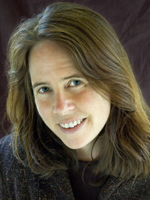
Pagan Kennedy
Co-author, Personalizing Medicine
Along with Lee Gutkind and Mike Rosenwald, Pagan Kennedy is co-author of Personalizing Medicine (forthcoming in 2010), one of the first books to document the rise of customized medicine. She is the author of 10 books in a variety of genres, from cultural history to science writing to fiction. She is a regular contributor to The New York Times and The Boston Globe, and also has published in The Village Voice, The Nation, Details, Dwell and many other venues. In 2002, one of Kennedy’s nonfiction books made The New York Times Notable list and earned Massachusetts Book Award honors. Her most recent novel, Confessions of a Memory Eater, was featured in Entertainment Weekly as an “EW pick.” She also has been the recipient of a Barnes and Noble Discover Award, a National Endowment for the Arts Fellowship in Fiction, and a Smithsonian Fellowship for science writing. Last year, Pagan was in residence at Dartmouth College as its Visiting Nonfiction Writer.
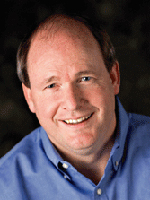
Gary E. Marchant
Professor of Law and Executive Director, Center for Law, Science & Innovation, Sandra Day O'Connor College of Law; Lincoln Professor of Emerging Technologies, Law and Ethics, and Professor, School of Life Sciences, Arizona State University
Gary Marchant’s research interests include the use of genetic information in environmental regulation, risk and the precautionary principle, legal aspects of personalized medicine, and regulation of emerging technologies such as nanotechnology, neuroscience and biotechnology. He teaches courses in Environmental Law, Law, Science & Technology, Genetics and the Law, Biotechnology: Science, Law and Policy, and Nanotechnology Law & Policy. Prior to joining the College faculty in 1999, Marchant was a partner at the Washington, D.C., office of Kirkland & Ellis, where his practice focused on environmental and administrative law. During law school, he was Editor-in-Chief of the Harvard Journal of Law & Technology and editor of the Harvard Environmental Law Review, and was awarded the Fay Diploma (awarded to top graduating student at Harvard Law School). Marchant frequently lectures about the intersection of law and science at national and international conferences. He has authored more than 60 articles and book chapters on various issues relating to emerging technologies. Among other activities, he has served on two National Research Council committees, has been the principal investigator on several major grants, and has organized numerous academic conferences on law and science issues. Marchant is Associate Editor, Nonlinearity in Biology, Toxicology and Medicine, (2003-present), and a member of the State Bar of Arizona, Executive Council of Environmental & Natural Resources Law, Translational Genomics Research Institute (TGEN), Conflicts of Interest Committee, American Bar Association, Environmental Law Institute, American Association for the Advancement of Science, Society for Risk Analysis, New York Academy of Sciences, Society of Toxicology, Neuroethics Society, and American Society of Law, Medicine & Ethics. In addition to his J.D. degree, Marchant has a Ph.D. in Genetics from the University of British Columbia, and a M.P.P. from the Kennedy School of Government at Harvard University.
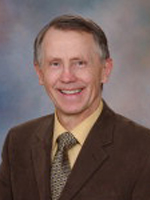
Donald E. McAlpine
Assistant Professor of Psychiatry, Mayo Clinic Minnesota
Donald McAlpine’s interests are in athletes and eating disorders, bariatric surgery and psychopharmacology, electroconvulsive therapy, obesity and psychopharmacology, non-exercise thermogenesis and anorexia nervosa, psychogenomics and drug metabolism, somatoform disorders, transcranial magnetic stimulation for depression and pain. He is certified in Psychiatry, Addiction Psychiatry, Geriatric Psychiatry, Adult Psychiatry/Psychosomatic Medicine, American Board of Psychiatry and Neurology. McAlpine received his undergraduate, pre-medical and medical degrees from the University of Minnesota, and did his residency at Mayo Graduate School of Medicine, Mayo Clinic, in Rochester, Minn.
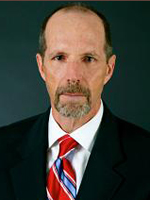
Robert J. Milligan
Attorney, Milligan Lawless Taylor Murphy & Bailey, P.C., Phoenix
Robert J. Milligan specializes in health-care law, representing individuals and companies in the health care and life sciences industry. His areas of practice include health care business transactions, health care fraud and abuse, health care labor and employment, health care licensing, life sciences, and medical staff relations. Milligan received a J.D. from DePaul University, and an LL.M. degree in Biotechnology and Genomics from the Sandra Day O’Connor College of Law, completing coursework and independent study in FDA regulation, pharmacogenomics, biotechnology science, law and policy, clinical research ethics, reimbursement, technology transfer, and technology licensing. He researches and writes on topics related to biotechnology, and his papers include, “FDA and the Role of Pharmacogenomics in Drug Development,” “Pharmacogenomics in Clinical Practice: Opportunities and Challenges,” “Coverage and Reimbursement for Pharmacogenomic Testing,” and “Pharmacogenomics and the Early Termination of Clinical Trials; Selected Ethical Issues.” Milligan is listed in The Best Lawyers in America, the Phoenix Business Journal’s 2009 “Best of The Bar,” and Southwest Super Lawyers, 2007-2009. He is a member of the State Bar of Arizona, the American Bar Association, Health Law Section, the American Health Lawyers Association, the Arizona Association of Health Care Lawyers’ Board of Directors, the Center for the Study of Law, Science & Innovation’s Advisory Board Member, and the EAR Foundation of Arizona’s Board of Directors.
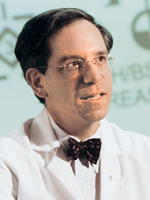
Kenneth Offit
Chief, Clinical Genetics Service, Memorial Sloan-Kettering Cancer Center, New York City
Kenneth Offit received his M.D. and M.P.H. from Harvard Medical School and Harvard School of Public Health, and he was trained in medical oncology and cancer genetics at Memorial Sloan-Kettering Cancer Center in New York City. Offit is a Professor of Medicine and Public Health at Weill Cornell Medical College of Cornell University, Vice Chairman of Memorial Sloan-Kettering's Program in Cancer Prevention and Population Research, and Vice Chairman for Academic Affairs in the Department of Medicine. His research group first described the most common mutation of the breast cancer gene 2 causing breast and ovarian cancer, and was also the first to prospectively establish the use of preventive ovarian surgery in individuals carrying breast cancer mutations. Offit received an award for his textbook, Clinical Cancer Genetics, and has received a career research recognition award from the American Cancer Society. He serves on federal advisory panels in public health genomics, and was senior author of the recent policy statement on cancer genomics by the American Society of Clinical Oncology.
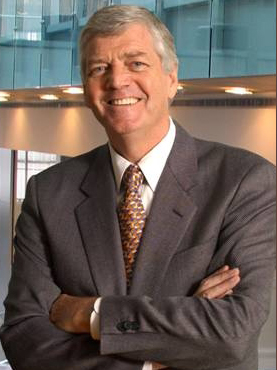
George Poste
Chief Scientist, Complex Adaptive Systems Initiative (CASI); Regents’ Professor and Del E. Webb Chair in Health Innovation, Arizona State University
In March 2009, George Poste assumed directorship of CASI, a program that links expertise across ASU in research on synthetic biology, ubiquitous sensing, healthcare informatics for personalized medicine and advanced computing for non-linear dynamics. From 2003-09, as Director of the Biodesign Institute at ASU, Poste designed and built 400,000 square feet of new facilities, achieved cumulative research funding of $225 million and recruited more than 60 faculty, including three members of the National Academies of Science and Engineering. He serves on the Board of Directors of Monsanto, Exelixis, Caris Dx., and the Scientific Advisory Board of Synthetic Genomics. He is a former Chief Science and Technology Officer and President, R&D, of SmithKline Beecham (1992-99), and while there was associated with the successful registration of 31 drug, vaccine and diagnostic products. In 2004 Poste was named the “R&D Scientist of the Year” by R&D Magazine, in 2006 he received the Einstein award from the Global Business Leadership Council, and in 2009 he received the Scrip Lifetime Achievement award voted by the leadership of the global pharmaceutical industry. Poste has published more than 350 research papers and edited 14 books on pharmaceutical technologies and oncology. He has received honorary degrees in science, law and medicine for his research contributions, and was honored in 1999 by Queen Elizabeth II as a Commander of the British Empire for his contributions to international security.
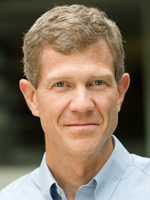
Scott D. Ramsey
Member, Cancer Prevention Research Program, and Director, Cancer Technology Assessment Group, Fred Hutchinson Cancer Research Center, Seattle; Professor, School of Medicine, School of Pharmacy, and the Institute for Public Health Genetics, University of Washington; Director, Cancer Prevention and Survivorship Program, Seattle Cancer Care Alliance.
Scott D. Ramsey is a general internist and health economist whose research focuses on economic evaluations in cancer. Ramsey has published widely on patterns of care, costs, and cost-effectiveness of treatments for lung, colorectal, and prostate cancer. His current studies, funded by the National Cancer Institute, National Human Genome Research Institute, Centers for Disease Control and Prevention, and several pharmaceutical manufacturers, include projects to develop a genetic screening policy model for colorectal cancer, a multicenter study of decision making for men with newly diagnosed prostate cancer, and studies of cancer screening, incidence, treatment, and outcomes for Native Americans diagnosed with cancer. Along with investigators at the University of Washington, Ramsey co-directs an NCI-funded training program in Biobehavioral and Cancer Outcomes Research. He is a member of the Institute of Medicine’s National Cancer Policy Forum.
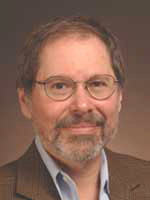
Michael J. Saks
Regents’ Professor of Law and Psychology, and Faculty Fellow, Center for Law, Science & Innovation, Sandra Day O’Connor College of Law, Arizona State University
Michael Saks’ research focuses on empirical studies of the legal system, especially decision-making, the behavior of the litigation system, and the law’s use of science. Saks is the fourth most-cited law-and-social-science scholar in the U.S., and has authored approximately 200 articles and books. Courses he has taught include criminal law, evidence, law and science, property and torts. Saks has served as editor of the journals Law & Human Behavior and Jurimetrics. Saks has been president of the American Psychology-Law Society and chair of the Section on Law and Social Science of the AALS. For a decade he taught in the University of Virginia Law School's LL.M. program for judges, Duke Law School’s “Judging Science” program and at the National Judicial College, and taught law professors at the Georgetown University Law Center, as well as numerous continuing education programs for attorneys, judges, and scientists. Before joining the College of Law in 2000, Saks was the Edward F. Howrey Professor at the University of Iowa, and he was on the staff at the National Center for State Courts. His work has earned numerous awards and been cited in a number of judicial opinions, including by the U.S. Supreme Court. Notwithstanding the above, Saks will speak from the perspective of a patient.
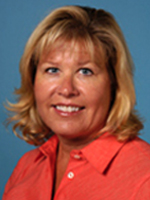
Maren T. Scheuner
Senior Research Scientist, Center for Health Policy Research, University of California, Los Angeles; Adjunct Associate Professor, UCLA School of Public Health
Maren T. Scheuner is trained as an internist and medical geneticist and specializes in the field of common disease genetics. Scheuner’s particular area of interest is health services and policy research related to effective and efficient clinical integration of new genetic/genomic technologies. Her current research activities focus on evaluation of the clinical validity and utility of family history tools in risk assessment and disease prevention, assessment of genetic testing technologies, and the intersection of health information technology and genetic/genomic medicine. Scheuner also is a natural scientist at the RAND Corporation, and a research health scientist at the Greater Los Angeles VA Healthcare System. She serves on several committees and boards addressing educational issues and access to quality genetic services, and has authored many articles and book chapters regarding family history of common diseases, genetic risk assessment and disease management and prevention. Scheuner has a bachelor’s degree in biology from the University of California, Riverside, a master’s degree in Public Health and a medical degree from the UCLA, and specialty training in internal medicine and medical genetics at UCLA training programs. She is a former Director of the GenRISK Program at Cedars-Sinai Medical Center and a faculty member in the Division of Medical Genetics at Cedars-Sinai and the Department of Medicine at the David Geffen School of Medicine at UCLA.
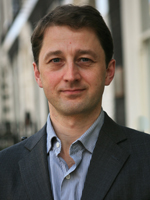
Harald Schmidt
Assistant Director, Nuffield Council on Bioethics, London
Since joining the Nuffield Council on Bioethics in 2002, Harald Schmidt has been involved with projects on pharmacogenetics, genetically modified crops, animal research, public health and personalized health care. Schmidt is a Commonwealth Fund Harkness Fellow in Health Care Policy and Practice at the Harvard School of Public Health. He also is working on a Ph.D. at the London School of Economics on personal responsibility for health. Schmidt studied philosophy, linguistics and history at the universities of Bremen, Oxford and Muenster. Following his studies, he worked with the Research Centre for Bioethics at the University of Muenster, the German Ministry of Health and the German Parliament.
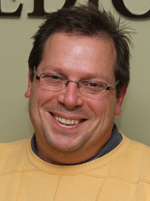
Peter J. Tonellato
Senior Research Scientist and Director, Laboratory for Personalized Medicine (LPM), Center for Biomedical Informatics, Harvard Medical School, and Visiting Professor, Department of Pathology, Beth Israel Deaconess Medical Center
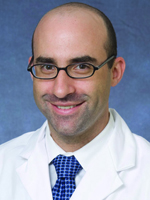
Glen Weiss
Co-head, Lung Cancer Unit, Translational Genomics Research Institute, and Director, Thoracic Oncology, TGen Clinical Research Services, Scottsdale Healthcare
Glen Weiss is a physician-scientist with a joint appointment at TGen Clinical Research Services at Scottsdale Healthcare and TGen. He is board certified in internal medicine and medical oncology. Serving as an interface between laboratory investigators and clinical research aspects, Weiss helps accelerate clinical application of new developments in cancer therapy and diagnostics. He sees and enrolls patients in early-phase clinical studies and is actively involved in laboratory research in the Lung Cancer Unit in the Cancer and Cell Biology Division at TGen.
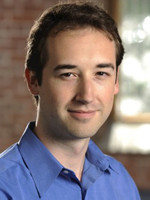
Paul Wicks
Research and Development Director, PatientsLikeMe
Paul Wicks is an internationally recognized expert in the psychological aspects of neurodegenerative conditions. He served as a driving force in launching the Parkinson’s disease and Multiple Sclerosis communities at PatientsLikeMe, which provides patients with access to the tools, information and experiences needed to take control of their diseases. Wicks and his team conduct scientific research that generates insights about the personal health data shared by patient members. Before joining PatientsLikeMe, Wicks traveled the United Kingdom, conducting neuropsychological testing on patients with rare forms of Amyotrophic Lateral Sclerosis/Motor Neurone Disease. Wicks has studied the psychological consequences of Parkinson’s disease, including a critical comparison of depression in Parkinson’s disease compared to clinical depression without Parkinson’s, an online validation of the NMS-QUEST non-motor scale, and the first comparison of pathological gambling in Parkinson’s and ALS. His research findings have been published in numerous peer-reviewed journals. Wicks is a frequent conference presenter and has twice won the British Neuropsychiatry Association prize for best speaker. He completed his Ph.D. thesis at King’s College in three years, passing his viva with no corrections — a rare achievement.
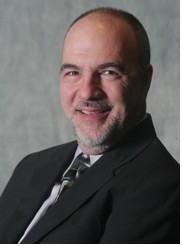
Marc S. Williams
Director, Intermountain Healthcare Clinical Genetics Institute, Salt Lake City; Clinical Professor of Pediatrics, Division of Medical Genetics, and Adjunct Professor of Biomedical Informatics, University of Utah
While working as a general pediatrician, Marc S. Williams pursued fellowship training in Clinical Genetics and became board certified in the specialty in 1996. In 1999, he gave up general pediatric practice and became the associate medical director of the Gundersen Lutheran Health Plan while maintaining his genetic practice. By combining these two areas of expertise, he developed an interest in the role of genetics in healthcare delivery, and has since published and presented extensively on this topic. In addition to directing the Intermountain Healthcare Clinical Genetics Institute, Williams runs a clinic for evaluation of adults with mental retardation, birth defects and genetic disorders. He is a director of the board of the American College of Medical Genetics, and in 2009 was elected Vice President of Clinical Genetics, participated in the Personalized Medicine Workgroup of the Department of Health and Human Services’ American Health Information Community Task Force, and became Vice Chair of the CDC’s EGAPP Stakeholder’s Group, a member of the CDC’s CETT program review board and a member of the Secretary’s Advisory Committee for Genetics, Health and Society. Williams chairs the subcommittee on Health Care Systems of the Section on Genetics and Birth Defects of the American Academy of Pediatrics, and founded the American College of Medical Genetics Quality Improvement Special Interest Group. He is the editor-in-chief of the Manual on Reimbursement for Medical Genetic Services, and has authored more than 40 articles in the peer-review medical literature and has presented more than 50 papers at national and international meetings.
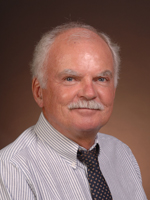
Andrew Askland
Instructor in Law, Director, Center for Law, Science & Innovation, Sandra Day O'Connor College of Law, Arizona State University
Andrew (Sandy) Askland is Director of the Center for Law, Science & Innovation at the College of Law, where he teaches courses in Privacy and Economics and the Law. He also has research interests in Environmental Ethics and Bioethics and in Moral and Political Theory generally. Askland is a member of the American Philosophical Association and served on the program committee of its Pacific Division. Prior to his arrival at the College in 1999, he was a visiting professor at the University of Guam and at Vilnius University in Lithuania, and he was an adjunct professor at the University of Colorado. Askland also has worked as a Foreign Service Officer, with postings in Mexico, the Legal Advisor's Office and Bahrain, an Assistant Public Defender in Rockville, Md., a political consultant and an attorney in private practice. Askland is a regular hiker and backpacker, canyoneer and whitewater rafter and a frequent sailor.
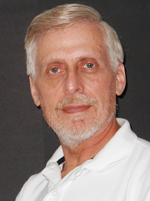
Mark S. Frankel
Director, Scientific Freedom, Responsibility and Law Program
American Academy for the Advancement of Science (AAAS)
Mark S. Frankel develops and manages AAAS’s activities related to professional ethics, science and society, and science and law. At AAAS he has directed projects on research integrity and scientific misconduct; human enhancement; the ethical and legal implications of genetic testing; an examination of errors in health care organizations; the ethical, religious and policy implications of human stem cell research; gene doping in sport; and the implications of advances in neuroscience research for the legal system, among others. He is a member of the Science and Ethics Advisory Group for Hoffmann-La Roche in Basel, Switzerland. Frankel is a former member of the Board of Directors of the National Patient Safety Foundation, and currently serves on the Board of the Food and Drug Law Institute and the Center for the Study of Law, Science & Innovation at the Sandra Day O’Connor College of Law at ASU. He is on the editorial boards of Science and Engineering Ethics, Ethics & Behavior, Professional Ethics, and the Journal of Empirical Research on Human Research Ethics. He is editor of AAAS’s quarterly publication, Professional Ethics Report, and a Fellow of AAAS.
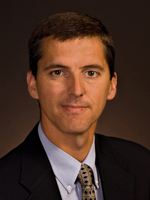
James G. Hodge Jr.
Lincoln Professor of Health Law and Ethics, Faculty Fellow, Center for Law, Science & Innovation, Sandra Day O'Connor College of Law, Arizona State University
Through scholarly and applied work, James Hodge delves into multiple areas of public health law, global health law, ethics, and human rights. Hodge teaches Health Law, Ethics, and Policy, Public Health Law and Ethics, and Global Health Law and Policy at the College of Law. Hodge, the recipient of the 2006 Henrik L. Blum Award for Excellence in Health Policy from the American Public Health Association, has drafted (with others) several public health law reform initiatives, including the Model State Public Health Information Privacy Act, the Model State Emergency Health Powers Act, the Turning Point Model State Public Health Act, and the Uniform Emergency Volunteer Health Practitioners Act. His diverse, funded projects include work on emergency legal preparedness; the legal framework underlying the use of volunteer health professionals during emergencies; the compilation, study and analysis of state genetics laws and policies as part of a multi-year NIH-funded project; historical and legal bases underlying school vaccination programs; international tobacco policy for the World Health Organization; legal and ethical distinctions between public health practice and research; legal underpinnings of partner notification and expedited partner therapies; and public health law case studies in multiple states. He is a national expert on public health information privacy law and policy, having advised numerous federal, state, and local governments on these issues. Before joining the College of Law faculty in 2009, Hodge was a Professor at the Johns Hopkins Bloomberg School of Public Health, an Adjunct Professor of Law at Georgetown University Law Center, and a Core Faculty member of the Johns Hopkins Berman Institute of Bioethics. He is a Senior Scholar at the Centers for Law and the Public’s Health: A Collaborative at Johns Hopkins and Georgetown Universities, President of the Public Health Law Association, and Vice-Chair of the ABA Public Health Interest Group.
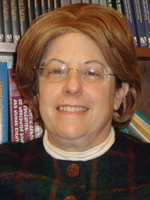
Deborah Runkle
Senior Program Associate, American Association for the Advancement of Science (AAAS)
Deborah Runkle provides staff support for the Committee on Scientific Freedom and Responsibility, is the Associate Staff Officer for the National Conference of Lawyers and Scientists (a joint standing committee of AAAS and the Science and Technology Law Section of the American Bar Association), and is Staff Liaison for the AAAS Scientific Freedom and Responsibility Award. She is interested in issues at the intersection of science and society, and science and law. Issues that she is currently focused on include personalized medicine, digital technologies, judicial education in neuroscience, scientific expertise in the courts, forensics, and the use of animals in research.
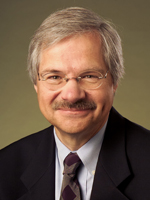
John J. Sninsky
Vice President, Discovery Research, Celera
John Sninsky’s primary focus is the application of genetic and genomic tools to identify and develop diagnostic and pharmacogenomic assays for common complex disease and cancer. Sninsky is the author of numerous scientific papers including methods in molecular biology, application of the polymerase chain reaction to cancer and virology and more recently genome-wide genetic disease association studies. Cardiovascular and liver disease as well as breast cancer has been the focus. Sninsky received a bachelor’s degree in biology from Bates College (1972) and a Ph.D. in biology from Purdue University (1976). He was a postdoctoral fellow in Genetics and Medicine at Stanford University School of Medicine (1977-81), and from 1981-1984, he was on the faculty at Albert Einstein College of Medicine in the Department of Microbiology and Immunology with a joint appointment in the Department of Molecular Biology. From 1984-1991, he worked at Cetus Corporation where he was responsible for the immunoassay and molecular diagnostics programs. From 1991-1998, Sninsky was the Senior Director of Research at Roche Molecular Systems. His team of scientists devised PCR diagnostic assays for many infectious pathogens as well as for genetic diseases and cancer. In 1998, he was promoted to Vice President, Discovery Research, and Vice President, Roche Genetics, an initiative that coordinated the genetic and genomic efforts between the pharmaceutical and diagnostics divisions. Sninsky joined Celera in 2001. Its Discovery Research group encompasses teams of scientists who work in specific disease areas, a high-throughput genotyping and expression facility, statistical genetics, biomarker development, computational biology and future diagnostic technologies.
